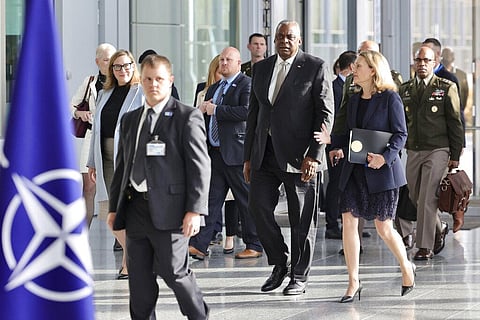

BRUSSELS: NATO defence ministers met on Wednesday as the alliance's member countries face the twin challenges of struggling to make and supply weapons to Ukraine while protecting vital European infrastructure like pipelines or cables that Russia might want to sabotage in retaliation.
In the almost eight months since President Vladimir Putin ordered his troops into Ukraine, the 30-nation military alliance has been treading a fine line, as an organisation, providing only non-lethal support and defending its own territory to avoid being dragged into a wider war with a nuclear-armed Russia.
Individual allies though continue to pour in weapons and ammunition, including armoured vehicles and air defence or anti-tank systems.
They're also training Ukrainian troops, building on the lessons NATO has taught Ukraine's military instructors since Russia annexed the Crimean Peninsula in 2014.
But as the Russian missile strikes across Ukraine this week demonstrated, this is not enough.
NATO defence ministers were taking stock on Wednesday of the supply effort so far and debating ways to encourage the defence industry to ramp up production in short order.
"Allies have provided air defence, but we need even more. We need different types of air defence, short-range, long-range air defence systems to take (out) ballistic missiles, cruise missiles, drones, different systems for different tasks," NATO Secretary-General Jens Stoltenberg said.
"Ukraine is a big country, with many cities. So we need to scale up to be able to help Ukraine defend even more cities and more territory against horrific Russian attacks against their civilian populations," Stoltenberg told reporters before chairing the meeting at NATO headquarters in Brussels.
At the same time, national military stocks and arsenals are being depleted. Some countries are growing reluctant to provide Ukraine with more when they are no longer entirely sure that they can protect their own territories and airspace.
The issue, as one senior diplomat put it, is: "how do we arm Ukraine without disarming ourselves?" The diplomat spoke on condition of anonymity because the discussions involve collective security concerns.
For the defence industry, predictability is paramount. Companies need long-term orders and certainty before they commit to extending production lines.
But no one is sure how long the war in Ukraine will last, making it difficult to know how much equipment is needed.
Still, Putin's attack on a sovereign country without provocation, and his threats to use nuclear weapons to defend seized territory, have made many allies neighbouring Russia and Ukraine jittery.
So the United States and its partners want to boost weapons production by sending clear signals to industry, as they pool resources and send Ukraine the hardware that it needs, all while ensuring that no major gaps appear in national stockpiles.
Putin, for his part, has warned NATO against deeper involvement in Ukraine.
In recent weeks, as power and gas bills spiral and Europe struggles to decrease its dependency on Russia for energy, apparent acts of sabotage damaged two major pipelines once meant to bring natural gas to Germany.
The Polish operator of the Druzhba -- or "Friendship" -- oil pipeline, one of the world's longest pipelines and which originates in Russia, said on Wednesday that it had detected a leak underground near the city of Plock in central Poland.
The line supplies crude to Belarus, Ukraine, Poland, Austria and Germany.
Stoltenberg said that following the apparent sabotage of the Nord Stream pipelines between Russia and Germany, NATO has "doubled our presence in the Baltic and North Seas to over 30 ships, supported by maritime patrol aircraft and undersea capabilities."
It's a small comfort, given that about 8000 kilometres (nearly 5,000 miles) of oil and gas pipelines crisscross the North Sea alone.
Systems, networks and grids are impossible to watch 24/7. Even the resources of energy companies, national authorities and NATO may not be enough to keep guard.
NATO's aim, for now, is to better coordinate between these actors, to better gather intelligence and improve the way it is shared, and watch over facilities, with aerial and undersea drones and other surveillance equipment.
No responsibility has been established for the pipeline incidents. But NATO is also trying to be clear in deterring Russia.
"Any deliberate attack against allies' critical infrastructure would be met with a united and determined response," Stoltenberg said ahead of Wednesday's meeting.
He declined to say what kind of response that might be, or whether an accumulation of such hybrid attacks might trigger NATO's collective defence clause -- Article 5 of its founding treaty -- which ensures that an attack on any one ally would be met with a response from them all.